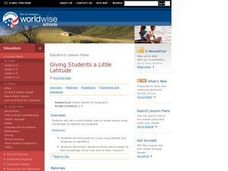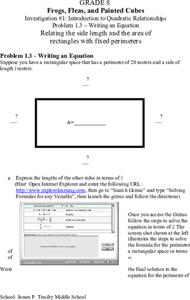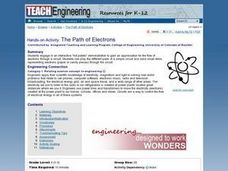Curated OER
Rearrange the Room
Second graders measure and grid their ideas for the new classroom floor plan. They create their own ideas for the classroom arrangement on grid paper. When they finish, they share their draft plan with their peers and with the teacher...
Curated OER
2 x 2
Students work together to grid a 2 x 2 meter unit using the formula for the Pythagorean Theorem. After creating the grid, they identify the location of artifacts and create a map of their location. They develop a graph and table of their...
Curated OER
Measurement and the Illampi Mound Colony
Young scholars comprehend the basic units of measurement, scale, plotting, and basic grids. Students practice their estimation
and measuring skills and will demonstrate their ability to work well in groups.
Curated OER
Grade 3: What Can I Make with 30 Centimeters?
Third graders create polygons with perimeters of 30 centimeters, use the centimeter grid paper to determine the area of each shape, and organize the shapes to make generalizations from the patterns they see.
Curated OER
Personal Learning Profile Project
Students take notes on a prepared advanced organizer. They analyze dreams and goals across many parts of life and create different types (paths) of goals to accomplish dreams. They classify dreams and goals generated across these ...
Curated OER
Perfectly Puzzling Pentominoes
Second graders utilize manipulatives (pentominoes) to demonstrate knowledge of: lines of symmetry, slides, reflections (flips), rotations (turns), area, and perimeter. This lesson gives students a meaningful way to practice these...
Curated OER
Random Sampling
In this random sampling worksheet, students compare data collected by a random sample to data collected by an actual count using pieces of paper with numbers written on them. They compare their data for the actual count to the random...
Curated OER
Squares and Square Roots
Learners find patterns relating the lengths of the sides of squares to their areas. In this squares and square roots lesson, students draw squares and find their areas. They estimate the sides of square when given the area. Learners use...
Pennsylvania Department of Education
Length and Perimeter
Third graders explore tessellations and the spatial concepts used in creating them. In this tessellations instructional activity, 3rd graders rotate, reflect and transform shapes to create tessellations. Students become...
Curated OER
Design Your Dream Room
Students determine length, width, perimeter, and surface area, and work with two-dimensional representations of three-dimension objects to design and write descriptions of their dream bedrooms.
Curated OER
Percentages: Fractions and Decimals
Second graders convert fractions to percentages. For this interactive whiteboard percentages lesson, 2nd graders problem solve using percentages, fractions, and decimals.
Curated OER
Introducing Powers and Models
Students construct two dimensional models to illustrate squared numbers. In this geometry lesson, students use graph paper and an x/y axis to build squares exponentially. Students identify powers and relationships between various figures...
Curated OER
Effigy Mound Activity
Students research effigy mounds of Native people in Wisconsin. They create large models of effigy mounds in a given area based on factual information from their studies and research.
Curated OER
LRO and the Apollo-11 Landing Site
In this Apollo-11 landing site worksheet, students read about the NASA Lunar Reconnaissance Orbiter (LRO) that will collect images at a higher resolution than ever before. Students study a grid showing the lunar landing site from Apollo...
Curated OER
Interdisciplinary Unit Planning II
Students create playground maps and identify means of using these maps to enhance social studies learning of elementary students. They develop elementary-level interdisciplinary unit plans using social studies content for the primary...
Curated OER
Tenths and Hundredths practice 21.1
For this identifying tenths and hundredths worksheet, students write fractions and decimals describing models, use grid paper to draw models of fractions and decimals, convert them, and answer word problems. Students answer twenty-two...
Curated OER
Pent-up Pentominoes
Students explore pentominoes in this activity. They build shapes as directed and color the tiles on their grid sheet.
Houghton Mifflin Harcourt
Random Samples: Estimating Population
With this estimating populations assignment, your class will learn about taking random population samples and calculating the average number of species in the samples to estimate the total population. Students use the given data to find...
Curated OER
Giving Students a Little Latitude
Young scholars use a world outline map to locate places using coordinates of latitude and longitude. They answer questions about places based on their knowledge of the map and on their research and make up more questions of this sort...
Curated OER
Introduction to Quadratic Equations
In this quadratic equations worksheet, 8th graders solve and complete 7 various types of problems. First, they find the area for each rectangle with a given perimeter. Then, students describe the shape of the graph and use the equation...
Curated OER
Pick's Theorem
Students investigate polygons and their lattice. In this calculus activity, students record data using different methods. They analyze their data and draw conclusions based on the relationship between the area and the interior lattice.
Curated OER
Graphing
Students collect data to create different types of graphs-line, pie, and bar graphs. They use StarOffice 6.0 to create graphs.
Curated OER
Baseball Geometry
Learners apply various methods for finding the volume and surface area of sphere. They compare and contrast results among these mathematical methods. They work in cooperative groups to discuss their results with one another.
Curated OER
The Path of Electrons
Young scholars engage in an interactive "hot potato" demonstration to gain an appreciation for the flow of electrons through a circuit. They role play the different parts of a simple circuit and send small items representing electrons...

























